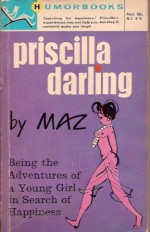
By Maz (Humorbooks)
No ISBN:
This little gem is a relic from a simpler time (although a quick scan of the internet reveals it to be still delightfully popular and readily available) when innocent smut was good, solid business, and genteel ribaldry could be infinitely double entendred for gentle laughs. Priscilla’s tale is the slight saga of an innocent English girl of good character and solid breeding who leaves her decent, upstanding family to go in search of happiness; becoming a very modern miss after illuminating encounters with “Ban the Bomb†marchers, soviet spies, Arab slavers, Hindu gurus, Eton-educated cannibals, assorted bandits and the good old British Navy.
This type of tale was very popular in the 1960s as cautious publishers tentatively acknowledged the zeitgeist of the times by not so much “Swinging†as “Gently Swayingâ€, but the real appeal of this still marvelously funny book is the copious vignettes, cartoons and saucy illustrations by the author: Dutch master storyteller, film-maker, draftsman and cartoonist Alfred Leonard Mazure who worked in Britain under the pen-name Maz.
Self-taught, Mazure (1914-1974) began his career in the Netherlands in 1932 with The Chef in Nieuwe Utrechtse Courant and De Prins, before embarking on a six-year journey of discovery through Europe and Africa. On his return to Holland in 1938 he created the seminal martial arts detective strip Dick Bos, best known to older fans and cognoscenti for their unique packaging (7cm broad and 11cm high {3″ x 4″} pocket sized digests).
Maz was the victim of an appalling, draconian contract in his own country, and remained anonymous and underpaid before moving to England after the War, where he gained a certain degree of fame and success with newspaper strips such as Dad and Egbert in John Bull and Passing Show, Sam Stone and Bruce Bunter in The Daily Herald (1948 to 1950), the brilliant adventure comedy Romeo Brown in The Daily Mirror (from 1954 to 1957 when he left the strip to the even more gifted Jim Holdaway), Jane, daughter of Jane – also in the fabulously comics-friendly Mirror – from 1961 to 1963 and Lindy Leigh for “top-shelf†men’s magazine Mayfair from 1969 to 1970.
Produced at the beginning of the 1960s sexual revolution, Priscilla Darling is a book crafted for an adult audience that probably knew less about sex and relationships than the average nine year old these days, but it’s undoubtedly a true guilty pleasure for anybody who can remember chaste kisses, the thrill of pursuit and the (far too) occasional coy and joyous surrender, anybody who yearns for beautifully rendered, sexually simpler times and anyone with an undying love of great cartooning.
© 1964 A. L. Mazure. All rights reserved.
